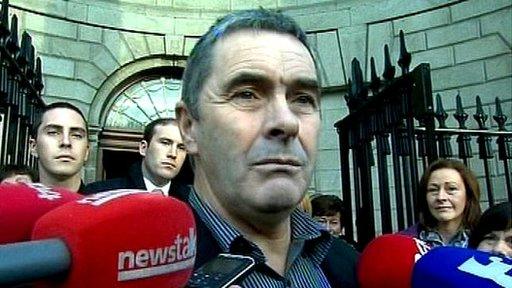Martin Conmey conviction over Una Lynskey 'miscarriage of justice'
- Published

Martin Conmey was cleared of the manslaughter 38 years after being jailed
A court in the Republic of Ireland has declared that a man's conviction for killing his teenage neighbour over 40 years ago was a miscarriage of justice.
In 2010, Martin Conmey was acquitted of the manslaughter of 19-year-old Una Lynskey, 38 years after he was jailed for three years for the offence.
Ms Lynskey disappeared close to her home at Porterstown Lane in Ratoath, County Meath, in October 1971.
Her body was discovered two months later near in the Dublin Mountains.
The cause of her death has never been determined.
Mr Conmey and his friend Dick Donnelly were convicted of Ms Lynskey's manslaughter in July 1972.
A third man, Martin Kerrigan, who was also suspected of having been involved in Ms Lynskey's death, was abducted and killed by Una Lynskey's brothers Sean and James Lynskey and her cousin John Gaughan nine days after her body was discovered.
Mr Donnelly won his appeal against his conviction in 1973, but Mr Conmey's conviction was upheld and he served three years in jail.
'Statements radically inconsistent'
In November 2010, the Court of Criminal Appeal overturned his conviction after finding that early statements taken from two witnesses that tended to favour Mr Conmey were not disclosed to the defence and were radically inconsistent with later statements of the same witnesses and evidence given at the trial.
The court heard that the statements in evidence at the trial placed Mr Conmey and Mr Donnelly on Porterstown Lane during the 15 minute period in which Ms Lynskey disappeared, having stepped off a bus at 18:55 GMT and walked towards her home.
Following the 2010 decision, Mr Conmey sought a declaration that his conviction was a miscarriage of justice.
In its ruling on Tuesday, the Court of Criminal Appeal (CCA) said Mr Conmey was convicted on the basis he was involved in a joint enterprise with others.
The CCA said there was no incriminating evidence that Mr Conmey was involved in a joint enterprise.
This was because three original statements of his co-accused were suppressed by a person unknown, but connected with the prosecution.
On this narrow basis the CCA found there had been a miscarriage of justice.
Mr Conmey's lawyers will now lodge an application for compensation as a result of the CCA's finding.
The 61-year-old embraced friends and family following the ruling.